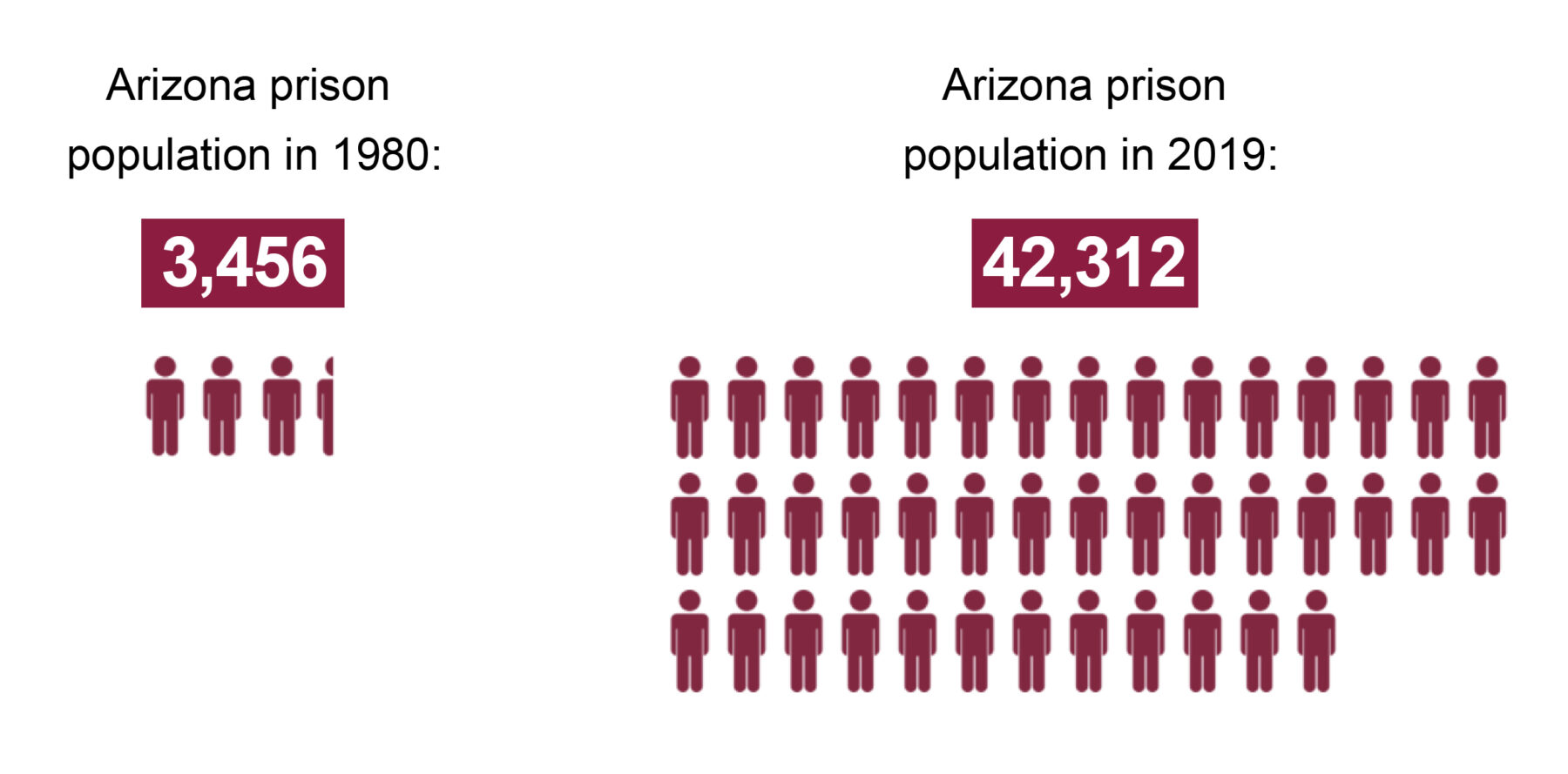
Reforming Arizona Criminal Justice
A collaborative project between the Academy for Justice and the Arizona State Law Journal.
Reforming Arizona Criminal Justice (RACJ) is a collection of accessible articles on Arizona criminal law written by the nation’s leading scholars.
Criminal justice reform is a frequent topic of conversation in Arizona, and for good reason. In a nation that leads the world in incarceration, Arizona has the country’s fifth highest imprisonment rate. And the situation is even worse than it seems. Because a disproportionate number of those trapped in the Arizona criminal justice system are also among the most vulnerable: the poor, the underserved, and minorities. So now, more than ever, Arizonans believe that the state needs to rethink its approach to criminal justice. But even with this groundswell of support for change, it’s proven difficult to find consensus on reforms. Here’s an idea: what if we ask some of the nation’s leading scholars to see what evidence-based solutions they would recommend for Arizona? Welcome to RACJ, a collaborative project from the Academy for Justice and the Arizona State Law Journal.
Why Reforming Arizona Criminal Justice?
Criminal justice reform is a frequent topic of conversation in Arizona, and for good reason. Over the past few decades, Arizona policymakers have been too quick to turn to the criminal law to deal with a wide range of social problems, producing a crisis of mass incarceration. Consider just a few data points:
- The United States is the world leader in incarceration: with only 5% of the world’s population, the nation houses around 25% of its prisoners. Arizona plays a pivotal role in securing America’s global status, with the 5th highest rate of incarceration in the nation.
- Prison populations throughout the United States skyrocketed over the past few decades, increasing 400% from 1980 to 2017. During this same period, the prison population in Arizona grew by 1,200%, expanding from 3,456 in 1980 to 42,312 in 2017. (This far outstripped the state’s general population growth.)
- Arizona’s prison population has continued to increase even as its crime rate has declined. For example, from 2000 to 2018, the Arizona prison population increased by 60%, while the property crime rate declined by 44% and the violent crime rate fell by 12%.
Using the national average for length of prison stay as a point of comparison, Arizona sentences for property crimes are 100% longer, sentences for drug offenses are 40% longer, and sentences for violent offenses are 25% longer.
Imprisoning more than 40,000 Arizonans is fiscally unsustainable, sure, but it’s also morally problematic. Arizona’s criminal justice policies have destroyed the lives of countless individuals, families, and communities. And the costs of incarceration are not borne equally. Instead, they’re concentrated in racially disparate ways and focused on the state’s most vulnerable populations. So now, more than ever, a broad and bipartisan swath of Arizonans believe that the state needs to rethink its approach to criminal justice. But even with this groundswell of support for change, it’s proven difficult to find consensus on reforms that would secure justice, promote equality, and protect public safety. Here’s an idea: what if we ask some of the nation’s leading scholars to see what evidence-based solutions they would recommend for the Arizona criminal justice system? Welcome to Reforming Arizona Criminal Justice (RACJ), a collaborative project from the Academy for Justice and the Arizona State Law Journal.
What is Reforming Arizona Criminal Justice?
RACJ is a special issue of the Arizona State Law Journal comprised of a dozen accessible articles on Arizona criminal justice policy written by some of the nation’s leading criminal justice scholars. Each of the articles offers an intimate look into Arizona criminal law, provides an overview of relevant academic research, and proposes concrete recommendations for reform. Together, these articles address a broad spectrum of topics across all major stages of the criminal process, with a particular eye toward the most pressing and salient issues of criminal justice reform in Arizona, including sentencing, prison oversight, bail and pretrial detention, juvenile justice, marijuana reform, forensic evidence, treatment of sex offenders, the policing of homelessness, and expungement.

Goals of Reforming Arizona Criminal Justice
The overarching goal of RACJ is to help bridge the gap between academia and criminal justice reform in Arizona. To achieve this goal, RACJ is organized around three main objectives:



These objectives respond to the call from the National Research Council’s groundbreaking 2014 report, The Growth of Incarceration in the United States: Exploring Causes and Consequences:
Given the prominent role played by prisons in U.S. society, the far-reaching impact of incarceration, and the need to develop policies that reduce reliance on imprisonment as a response to crime, public and private research institutions and statistical agencies should support a robust research and statistics program commensurate with the importance of these issues.
Although there has been a significant increase in criminal justice scholarship in recent years, much of it remains inaccessible and too abstract to be used by those working on criminal justice reform. And nearly all criminal justice scholarship is focused on the conceptual “U.S. criminal justice system,” as opposed to the particular states and localities where criminal justice policy is actually made. RACJ pursues a different approach by offering a series of accessible articles written by some of the nation’s leading criminal justice scholars on targeted issues of Arizona criminal justice. These contributions do more than just offer general directional encouragement—such as, “Arizona should punish less” or “invest more money in prison programming.” Instead, they offer concrete guidance on how Arizona and its localities might chart a realistic path forward on a diverse set of criminal justice issues.
Resulting Project Resources
Each of these articles offers an intimate look into Arizona law, provides an overview of relevant academic research, and proposes concrete recommendations for reform. Together, these articles address a broad spectrum of topics across all major stages of the criminal process, with a particular eye toward the most pressing and salient issues of criminal justice reform in Arizona.
Expungement Reform in Arizona: The Empirical Case for a Clean Slate
Sonja B. Starr discusses that in the past few years, many states have adopted or expanded legislation allowing people who meet certain eligibility requirements to expunge their adult criminal convictions. The latest wave of reforms makes this relief automatic after the requisite number of crime-free years have passed.
Forensic Evidence in Arizona: Reforms for Victims and Defendants
Valena E. Beety, Professor of Law in Sandra Day O’Connor College of Law at Arizona State University, recognizes the strengths of the current forensic evidence system in Arizona and proposes innovative reforms appropriate for labs that are leaders in the field. Arizona is particularly well situated to increase its lab independence and to serve additional members of the criminal legal community: namely, defendants and victims.
Ensuring Marijuana Reform Is Effective Criminal Justice Reform
This essay discusses how Arizona should best advance marijuana legalization so that it can significantly improve Arizona’s criminal justice system. Now that Arizona has legalized marijuana via ballot initiative, we focus on steps that Arizona policymakers and advocates who are interested in improving the criminal justice system can take to ensure that legalization best advances this goal.
Arizona’s Sex Offender Laws: Recommendations for Reform
This article recommends ways to reform Arizona’s sex offender laws. It focuses first on laws designed to address the danger posed by convicted sex offenders: registration requirements, community notification, residence restrictions, and civil commitment.
Homelessness, Indignity, and the Promise of Mandatory Citations for Urban Camping
Custodial arrests for the crimes intrinsically connected to homelessness, such as urban camping, inflict needless indignity on Arizona’s homeless residents. Arizona has an estimated 10,000 individuals currently experiencing homelessness, nearly half of whom are unsheltered—living on the streets, in desert washes, in vehicles, or other places not meant for human habitation.
Reforming Sentencing Policies and Practices in Arizona
This article calls for sentencing reforms designed to slow the flow of people into prison, reduce both the number of persons now incarcerated and the lengths of sentences they are serving, and ameliorate unwarranted disparities in imprisonment.
Improving Criminal Justice Decisions
All government decisions matter. But few matter more than those involving the criminal justice system. These are not easy decisions. Nor do we expect public officials to always get them right. But given the high stakes and human consequences involved, we do have a legitimate expectation that these decisions will be made in the right way—that is, rationally, deliberately, and informed by expertise.
Safety, Crisis, and Criminal Law
This article argues that the overlapping crises of 2020 expose dysfunction in the way criminal law has defined and promoted safety. Simply put, reliance on detention and rigorous, though disproportionate policing and prosecution of minority communities has failed to promote safety in the face of a global pandemic and the killing of Black and Brown people by police.
Advancing Bail and Pretrial Justice Reform in Arizona
This article assesses Arizona’s pretrial justice reforms to date and suggests some ways to further improve pretrial justice, to remedy the fact that 78.5% of the people held in the state’s jails have not been convicted of the crimes for which they were arrested, but rather are awaiting trial.
Vulnerable and Valued: Protecting Youth from the Perils of Custodial Interrogation
This article advocates for judicial and legislative reforms that will ensure all youth are protected from the harms of coercive police interrogation. Drawing upon the substantial body of research on adolescent development and the growing body of research on racial bias and the experiences of youth of color, this article finds that current Arizona law leaves youth vulnerable to wrongful convictions and trauma caused by coercive interrogation practices.
Raising Arizona’s Commitment to Health and Safety: The Need for Independent Oversight of Arizona’s Prison System
Arizona’s correctional system has long been the subject of high-profile lawsuits, scandals, and other serious grievances that demand increased levels of transparency and accountability.
The Incentives of Private Prisons
A common criticism of private prisons is that they encourage the firms running them to cut services, programming, and training, since cutting costs maximizes profit, and the resulting increases in recidivism actually help keep prisons full and the payments coming in.
Project Organizers

Michael Serota
Visiting Assistant Professor
Associate Deputy Director, Academy for Justice
Arizona State University
RACJ was developed and organized by ASU law professor Michael Serota.
Project Contributors

Valena Beety
Professor of Law
Deputy Director, Academy for Justice
Arizona State University

Douglas A. Berman
Newton D. Baker-Baker & Hostetler Chair in Law
Executive Director – Drug Enforcement and Policy Center
The Ohio State University

Jenny E. Carroll
Wiggins, Childs, Quinn
& Pantazis Professor of Law
University of Alabama

Michele Deitch
Distinguished Senior Lecturer
Lyndon B. Johnson School of Public Affairs
The University of Texas at Austin

Henry F. Fradella
Professor, Associate Director
School of Criminology and Criminal Justice
Arizona State University

Christine S. Scott-Hayward
Associate Professor of Law, Criminology, and Criminal Justice
School of Criminology, Criminal Justice, and Emergency Management
California State University, Long Beach

Kristin Henning
The Blume Professor of Law
Director – Juvenile Justice Clinic and Initiative
Georgetown Law

Alex Kreit
Assistant Professor of Law
Director – Center for Addiction Law & Policy
Northern Kentucky University

Tamara Rice Lave
Professor of Law
Director – Litigation Skills Program
University of Miami School of Law

Ben A. McJunkin
Associate Professor of Law
Associate Deputy Director – Academy for Justice
Arizona State University

Rebba Omer
Program Manager & Staff Attorney
Juvenile Justice Clinic and Initiative
Georgetown Law

John F. Pfaff
Professor of Law
Fordham University School of Law

Cassia Spohn
Foundation Professor
Director – School of Criminology and Criminal Justice
Arizona State University

Sonja B. Starr
Professor of Law
The University of Chicago Law School